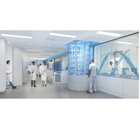ISG secures major laboratory contract

ISG has been awarded a £21 million fit-out project by HSL (Health Service Laboratories) to create its new London core laboratory. The work includes the installation of the building’s complex M&E infrastructure. The 12 400 m2 laboratory in the Halo building at One Mabledon Place in the emerging biosciences corridor in Kings Cross will see the consolidation of existing disparate pathology facilities from north-central London into what will become one of the largest pathology laboratories in Europe.
The Cat B fit-out will include specialised containment-level 3 (CL3) facilities that are suitable for research and testing of contagious and life-threatening viruses. The CL3 laboratory involves the installation of custom-designed ventilation services, with HSE-approved air-locking systems.
ISG will also create a number of specialised laboratories and the largest blood-sciences laboratory in the UK.
The remit includes the ultimate commissioning of all laboratory services.
Paul Sharp, divisional director of ISG’s engineering-services business, said, ‘This is a flagship project of national and international standing. From One Mabledon Place, HSL will deliver testing and host world-class research facilities. The scheme builds on our considerable expertise in the healthcare, R&D, biotechnology and life-sciences sector, leveraging our experience of specialist laboratory fit-out to deliver a scheme that is both technically and logistically challenging.’







